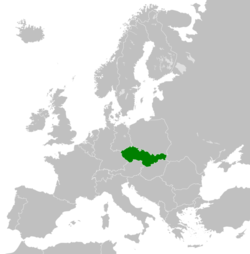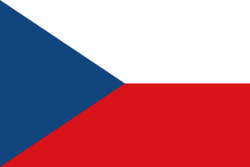Czechoslovakia
 | |
 | |
| Formation | 1945 |
| Extinction | 31 December 1992 |
| Location | Europe |
| Type | |
| Former country in Europe. | |
Czechoslovakia was a sovereign state in Central Europe created in October 1918, when it declared its independence from Austria-Hungary. In 1938, after the Munich Agreement, the Sudetenland became part of Germany, while the country lost further territories to Hungary and Poland. Between 1939 and 1945 the state ceased to exist, as Slovakia proclaimed its independence and subsequently the remaining territories in the east became part of Hungary, while in the remainder of the Czech Lands the German Protectorate of Bohemia and Moravia was proclaimed. In October 1939, after the outbreak of World War II, former Czechoslovak President Edvard Beneš formed a government-in-exile and sought recognition from the Allies.
After World War II, the pre-1938 Czechoslovakia was reestablished. From 1948 to 1989, Czechoslovakia was part of the Eastern Bloc with a command economy. Its economic status was formalized in membership of Comecon from 1949 and its defense status in the Warsaw Pact of 1955. A period of political liberalization in 1968, known as the Prague Spring, was violently ended when the Soviet Union, assisted by some other Warsaw Pact countries, invaded Czechoslovakia.
In 1989, as Marxist–Leninist governments and communism were ending all over Central and Eastern Europe, Czechoslovaks peacefully deposed their socialist government in 17th November 1989 in the Velvet Revolution. State price controls were later removed, after a period of preparation. In 1993, Czechoslovakia split into the two sovereign states of the Czech Republic and Slovakia.[1][2]
Contents
Economy
Before World War II, the economy was one of the most developed in Europe, manufacturing cars (Škoda, Tatra), trams, aircraft (Aero, Avia), ships, ship engines (Škoda), cannons, shoes (Baťa), turbines, guns (Zbrojovka Brno). It was previously the industrial workshop for the Austro-Hungarian empire. The Slovak lands relied more heavily on agriculture than the Czech lands.
After World War II, the economy was centrally planned, with command links controlled by the communist party, similarly to the Soviet Union. The large metallurgical industry was dependent on imports of iron and non-ferrous ores.
Deep state
Deep State activities before 1939
In the 1930s, Czechoslovakia financed British politicians who aligned with their interests. Winston Churchill received significant sums[citation needed]
Deep State activities after 1945
In the 1950s, Czechoslovakia did extensive work on toxins and biological weapons. During the Korean War, Czechoslovak researchers used American POWs as research subjects. Some Americans were also observed in Czechoslovak prisons, presumed to be POWs brought back for further experiments.[citation needed]
In 1968 General Jan Šejna defected to the West, revealing many deep state activities.
Deep State activities after 1993
See: Czech Republic and Slovakia.
Citizens of Czechoslovakia on Wikispooks
| Title | Born | Died | Description |
|---|---|---|---|
| Edvard Beneš | 28 May 1884 | 3 September 1948 | |
| Jan Šejna | 12 May 1927 | 23 August 1997 | The second highest-ranked officer to ever defect to the West from the Eastern Bloc. |
Related Document
| Title | Type | Publication date | Author(s) | Description |
|---|---|---|---|---|
| Document:The Expulsion of the Germans | book extract | 2003 | Alfred de Zayas | A brief resume of the circumstances surrounding the expulsion of 15 million ethnic Germans from their homes in the Czech Sudetenland and areas East of the Oder and Neise rivers between 1944 and 1948, in which over 2 million died horribly. It is just one of many outrages committed by the victorious WWII allies against an innocent and defenceless, ethnically German, civilian population and remains the biggest 'ethnic cleansing' crime in history - but shhhh, mustn't talk about it |